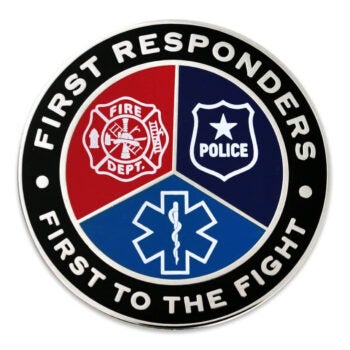Home / Health & Wellness Articles / News /
Prioritizing Mental Health as a First Responder

The day-to-day life of a first responder is much different than for the rest of us. Instead of worrying about things like grocery shopping or walking the dog, they have concerns like house fires or car accidents. Frequently witnessing traumatic scenes on the job can significantly impact a person’s mental health, which is why it’s especially important for first responders like police, EMT’s, and firefighters, to prioritize their mental well-being.
It can be hard for some first responders to find separation between their work and personal lives. “It’s less about trying to separate work and personal life, and more about how to process what happens at work, and not letting it consume you,” says Becky Stoll, Senior Vice President, Crisis Services at Centerstone. When first responders are new to their position, it can be helpful for them to take the time needed to figure out how to prepare for and manage everything that the job will entail.
Feeling supported by friends and family members can be immensely helpful to first responders. While some people respond differently than others, Stoll recommends that they sit down with their loved ones, and discuss how to best communicate with them when they experience trauma at work. Whether they want their spouse to provide space, or want them to lend a listening ear, communication is key in making sure they feel supported when they need it.
It can also be helpful for spouses or loved ones to know the red flags for adverse responses to work-related experiences. Most first responders develop a level of desensitizing at work so that they’re able to effectively do their jobs, however, this doesn’t mean that they won’t be affected. Red-flag reactions can include things like suicidal ideation, excessive alcohol and drug use, or increased aggression. If family sees these behaviors in their first responder loved ones, this may indicate that the first responder is experiencing mental health concerns and may need to consider accessing resources for additional support.
In some cases, part of their internal conflict can stem from being unable to help or save the people involved. Even if some lives were saved, some first responders might consider it a failure if others were not. While it can be hard for them not to take the perceived failure personally, it’s important to remember that these things can happen as part of the job, and is not a reflection of who they are.
The mental health resources available to first responders may depend on which department they’re in and where they’re located. These resources can include critical incident response teams, peer responders, behavioral health teams, or employee assistance programs. Using these kinds of supports is crucial for these every day heroes to keep their mental health in check.
If you or someone you know is experiencing mental health concerns as a result of your job, Centerstone can help. Visit our counseling services page, or call 877-HOPE123 (1-877-467-3123) to learn more.


